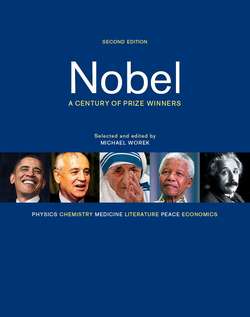Читать книгу Nobel - Michael Worek - Страница 56
На сайте Литреса книга снята с продажи.
ОглавлениеFrederick Soddy (1877–1956)
1921 Chemistry
For his contributions to our knowledge of the chemistry of radioactive substances, and his investigations into the origin and nature of isotopes.
The son of a London merchant, Frederick Soddy was born on the September 2, 1877, in Eastbourne, Sussex, England. A man of strong principles and fixed ideas, he was always friendly with his students but showed a strict character with his colleagues. A notable scientist, he carried out research in the field of radioactive substances and developed the theory of isotopes, which earned him the 1921 Nobel Prize in Chemistry.
Soddy began his studies in his hometown before attending University College of Wales. He received a scholarship to Oxford in 1895 and graduated with honors at the age of 21. He then carried out research there for two years before moving to Canada. Between 1900 and 1902, he was an assistant in the department of chemistry at McGill University, Montreal, Canada. Along with the physicist Ernest Rutherford, winner of the 1908 Nobel Prize in Chemistry, he published a series of studies on radioactivity.
On his return to the United Kingdom, Soddy worked with the chemist William Ramsay at University College, London. He then lectured on physical chemistry, and radioactivity at the University of Glasgow between 1904 and 1914, continuing his experiments with radioactive material during this time.
Frederick Soddy reached the peak of his scientific career in 1913, when he became the first person to demonstrate the existence of isotopes. The following year, he was made professor of chemistry at the University of Aberdeen. The outbreak of World War I, however, prevented him from further major research. After the war ended, in 1919, Soddy began lecturing in chemistry at Oxford University. He remained at Oxford until 1937, the year his wife, Winifred Beilby, whom he had married in 1908, died.
The success he achieved as a chemist did not prevent Soddy from turning his attention to social, political and economic affairs. He was extremely critical of the failure of economic systems to take advantage of technological and scientific advances, but his theories in this area did not win much support. Nevertheless, he was recognized for his academic work and received an honorary doctorate from Oxford, was made a member of the Royal Society in 1910 and awarded the Albert Medal in 1951.
Frederick Soddy died in Brighton, Sussex, England. He left behind a number of significant scientific works, including Radioactivity (1904), The Interpretation of Radium (1909), The Chemistry of the Radioactive Elements (1912–1914), The Interpretation of the Atom (1932), The Story of Atomic Energy (1949) and Atomic Transmutation (1953).
